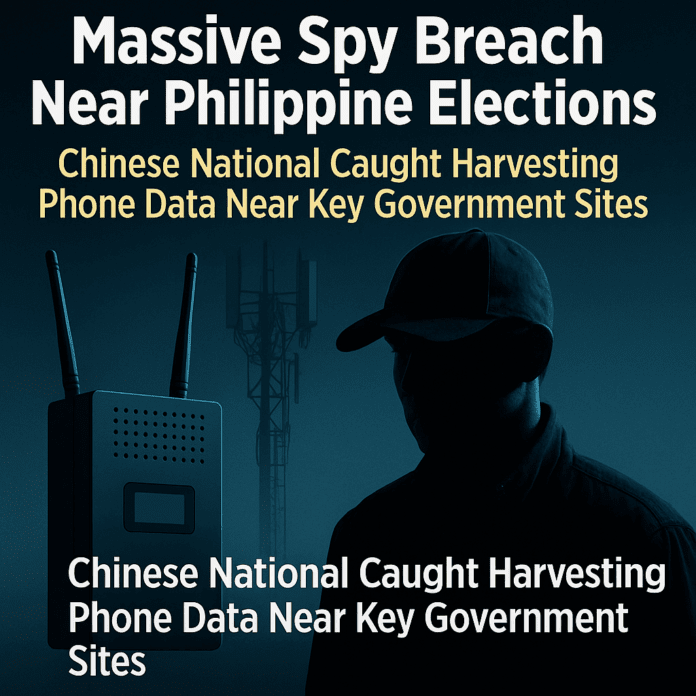Spy activity caused a major security breach just days before the national elections, as the National Bureau of Investigation (NBI) in the Philippines revealed that a suspected Chinese national was caught using a high-tech device to gather mobile phone data. Now under arrest, the individual allegedly operated an IMSI catcher — a tool used to secretly collect mobile phone information from people in the area.
The spy didn’t wander aimlessly. Instead, he drove close to some of the country’s most critical government buildings, including the Supreme Court, Department of Justice, Villamor Airbase, Bureau of Internal Revenue (BIR), and the Commission on Elections (Comelec). All of these institutions are vital to the country’s legal, financial, and security operations.
According to NBI officials, the suspect was under close surveillance for five days before agents moved in and arrested him on April 29. The arrest happened near the Comelec headquarters in Intramuros, Manila, where he was found in possession of the spying equipment.
The device he was carrying was not an ordinary gadget. It was capable of pretending to be a real cell tower, tricking nearby mobile phones into connecting to it. Once phones were connected, the device could gather private data from them — including information that can reveal a person’s identity and even track their location.
F-16 Arrival Turns Explosive as Espionage Fears and Malfunctions Shake Bulgarian Air Base
Thousands of Phones Compromised by the Spy
The scale of the breach is massive. During a Senate hearing, the NBI stated that around 5,000 mobile phone subscribers had their data accessed by the device. That means thousands of individuals — not just employees working at the government offices nearby, but also random passersby — unknowingly had their phone data collected.
The IMSI catcher has an impressive range. It can cover anywhere from 500 meters to 3 kilometers in all directions. In a densely populated area like Manila, this translates into a huge number of people being exposed to surveillance. People walking on the streets, riding in cars, or working in nearby buildings could all have had their personal data picked up by the device.
The NBI said its technical experts are now carrying out a detailed investigation in their cyber-forensics lab. They are carefully examining the data captured by the device to understand exactly what was collected and whether any sensitive information was compromised. The agency plans to release an initial report before the national and local elections on May 12.
Once the investigation is completed, the NBI will also send a copy of their findings to the Commission on Elections. This is especially important because the spy was caught near the Comelec office, raising concerns about possible threats to the electoral system.
Chilling Chinese Espionage Plot Erupts at Hotel in Alps Near F-35 Facility
Comelec Denies Any Breach in Election Systems
Despite the incident, Comelec officials have assured the public that the country’s election systems are safe. During the same Senate hearing, Comelec leadership confirmed that none of their systems were hacked and no election data was stored at the Intramuros location where the spy was arrested.
According to the Commission, all sensitive election-related data is kept at a separate, undisclosed location. They emphasized that the safety of the country’s election systems remains intact, and there is no evidence that the spy’s device had accessed any critical electoral data.
However, Comelec officials raised a different kind of concern — the spread of fake news. They stated that over the past month, there has been a deliberate campaign of misinformation and disinformation aimed at the Commission. The goal of this campaign, they believe, is to create distrust among voters and question the integrity of the election process.
Officials warned that these efforts could intensify as the May 12 elections approach. They said these actions are trying to manipulate public opinion, possibly to favor certain candidates or create confusion and fear.
Philippines Arrests Deng Yuanqing Over Espionage Equipment and Spy Allegations
The National Security Council earlier noted that there were signs of foreign interference in the upcoming elections, suggesting that certain international players, possibly from China, may be attempting to sway the results in favor of specific candidates. The Chinese Embassy in Manila has publicly denied these accusations.
For now, the investigation is still ongoing. While no direct compromise of election data has been found, the fact that such spying equipment was used so close to vital government offices has raised alarm bells about the country’s cybersecurity and intelligence defenses. As the nation prepares for a major vote, security agencies are working to uncover the full extent of this unauthorized surveillance.


